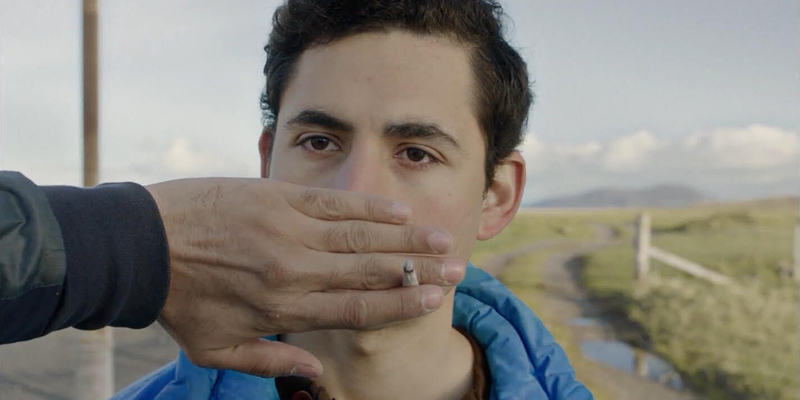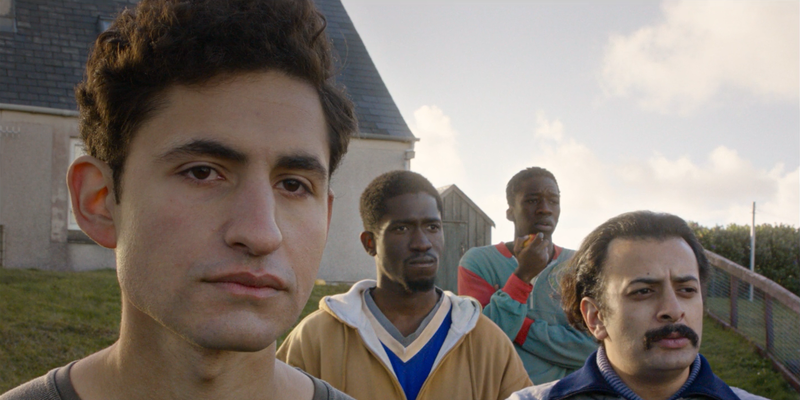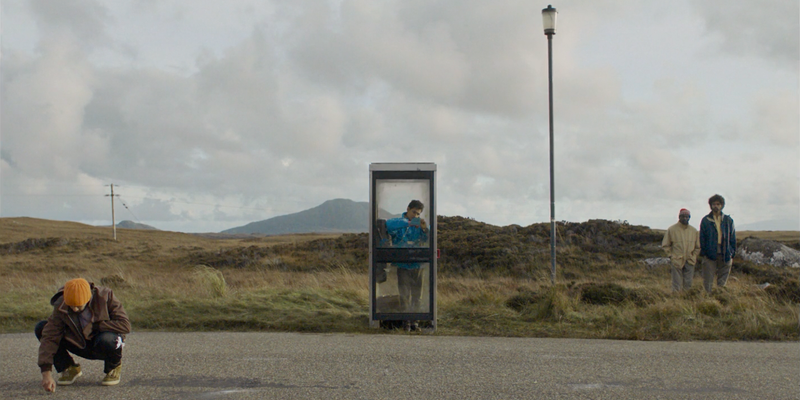
Review by
Eric Hillis
Directed by: Ben Sharrock
Starring: Amir El-Masry, Vikash Bhai, Sidse Babett Knudsen, Kwabena Ansah, Ola Orebiyi, Kenneth Collard

Movies concerned with the plight of refugees are rarely a barrel of
laughs. Somebody forgot to tell this to writer/director
Ben Sharrock, who takes a cue from Preston Sturges and uses
comedy to highlight what was Europe's biggest crisis before a certain
virus arrived on our shores.

Limbo focusses on the mundane existence of a quartet of
asylum seekers left to stew on a wind-battered Scottish island while
they wait for their requests to stay in the UK to be rubber-stamped or
rejected. Abedi (Kwabena Ansah) and Wasef (Ola Orebiyi)
are Nigerian brothers who bicker over everything from their prospects in
Britain to plotlines from Friends. The happy-go-lucky, Freddie Mercury obsessed Farhad (Vikash Bhai) has left Afghanistan and is naively optimistic about what a life in
the UK may bring him. Our main focus is on Omar (Amir El-Masry),
a musician who fled Syria but decided to travel on to the UK rather than
settle with his parents in Istanbul.
Sharrock establishes this world and its inhabitants – both the refugee
newcomers and the island's natives – through a series of vignettes,
which often border on absurdist comedy. The refugees are treated in
patronising fashion by a pair of well-meaning but tone-deaf instructors
(Sidse Babett Knudsen and Kenneth Collard) who lecture
them in subjects as varied as how to apply for job vacancies and how to
interact with British women in nightclubs. When they're not being
subjected to such demeaning lessons, the lads aimlessly wander the hills
and shores of the island like migrant cousins of the elderly heroes of
Last of the Summer Wine. Occasionally they interact with the locals, who like so many rural
folk, are a contradictory mix of xenophobia and simple human decency
(after subjecting Omar to Islamophobic invective, a pair of teenage
boy-racers offer him a lift, concerned he might catch a cold in the
rain).

As the narrative progresses, it narrows its focus on Omar, who is
suffering an existential crisis. His weekly phone calls to his parents
leave him wracked with guilt over not staying in Syria to fight
alongside his brother (which party his brother is fighting for in that
complicated conflict is left ambiguous), and for not keeping in practice
with his Oud, having lugged the instrument across the Middle East and
Europe. For Omar, the Oud represents the life he has left behind, and it
hurts him too much to play it. His hand is in a plaster but you get the
sense that's a convenient excuse for keeping the instrument locked away.
When he watches YouTube videos of his performances before the war, Omar
is moved to tears, presuming he'll never find himself in such a position
again. But perhaps rivaled only by food, music is what keeps traditions
alive among immigrants, so we're rooting for Omar to summon up the
courage to play once more.
Initially it might seem Sharrock is presenting a cynical take on this
scenario, as we're asked to laugh at practically every character we meet
save for the educated, once middle-class Omar. There is something a
little elitist about how Sharrock views the people who populate his
film, and I was slightly irked at how he positions us to laugh at them
only to turn on a sixpence halfway through and make us feel bad for
doing so. It's something of a cheap trick, and in his film's second
half, Sharrock largely trades comedy for pathos rather than organically
blending the two.

But for all its snark, Limbo is ultimately a hopeful film
that refreshingly suggests that communities can live together in harmony
once they get over any fears stoked by external forces. The only major
difference between the locals of the island and the refugees is that the
former don’t realise they're in limbo, and have made peace with their
position. As working class Brits they're all too aware that the
propaganda the instructors feed the refugees about how "if you work hard
enough you can become anything you want" is a falsehood, and if Omar and
his mates are to make a home in their new land, it's a lesson they'll
need to learn themselves.


